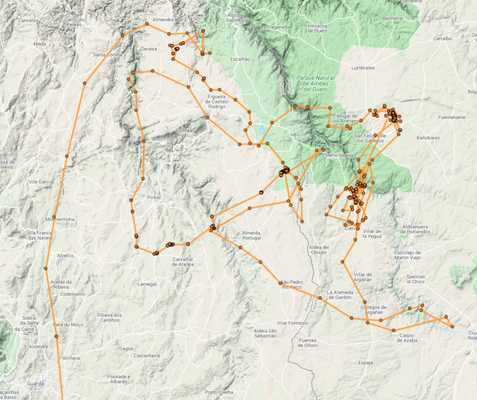
At first, we were worried that Egyptian Vulture Fangueiro might not survive in the wild due to its complicated health issues, yet the bird proved to be an excellent traveller, defying all odds. After its release in the Douro in Portugal, the young vulture successfully migrated to Africa but only spent two months on the continent before returning to Europe, which is atypical behaviour for the species. Now, nearly two months after it reached the Spanish shores, Fangueiro reached the Douro again.
Rescue, rehabilitation and release
Found weak at Fão, Portugal, and with problematic feathers after experiencing severe hunger in the nest, Fanguiero was rescued in autumn of 2019 and spent almost a year in a rehabilitation centre. There, it underwent several operations and treatments to grow healthy feathers while also getting new ones through feather transplants. Fangueiro made a full recovery, was tagged with a GPS-tag and was released on 13 July 2020 at the Douro within the LIFE Rupis project.
Successful migration to Africa and early return to Europe

Since its release, Fangueiro has been exploring Douro’s surrounding areas in the summer months and started heading south in early October. After spending some time in the south of Spain, on 26 October 2020, Fangueiro finally started crossing the Strait of Gibraltar, finishing this challenging trip in a mere 20 minutes. Once the vulture reached Morroco, it didn’t really rest but rather continued heading south. Fangueiro pursued a more west route south compared to other Egyptian Vultures from the Douro. The most surprising movements began when Fangueiro flew southwest and ended up at the most northwestern part of Mauritania at the coast on 8 November. Without taking a day to rest, it suddenly turned around and flew north instead of turning south-east. Fangueiro then crossed Morocco and reached Algeria in early December. Then, at the end of December, just before the new year, Fangueiro crossed the Strait of Gibraltar once again. The return of Fangueiro to Europe at this time was quite unusual. Young Egyptian Vultures usually stay in Africa for at least 18 months (often longer) before returning to their natal origins in Europe in the spring and starting their annual cycle of migration to Africa in the autumn and back to Europe in the spring. After five or six years, they reach sexual maturity and try to establish their own territory and form a breeding pair, often not far from where they hatched themselves.
Travels of Fangueiro after it reached Europe
The Vulture Conservation Foundation’s (VCF) monitoring team has been closely tracking the movements of Fangueiro throughout its journey, eagerly waiting to see where this incredible bird would travel to next. The bird could overwinter in Extremadura, where the largest known wintering population of the species in mainland Europe exists, but instead, Fangueiro stayed for two weeks around Jerez de la Frontera in Andalusia and then moved northwards to Parque Natural Sierra de Hornachuelos, northwest of Cordoba. On 11 February 2021, Fangueiro continued north and reached the Southern Douro region on 15 February, where it switches between the Portuguese and Spanish side.
Stay tuned with Fangueiro’s movements by following us on Facebook and Twitter.




